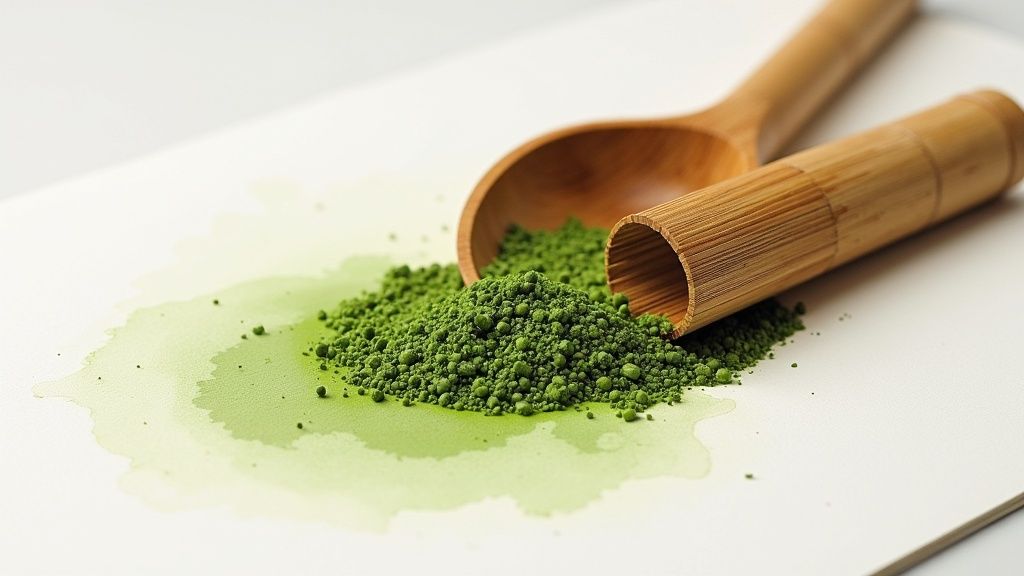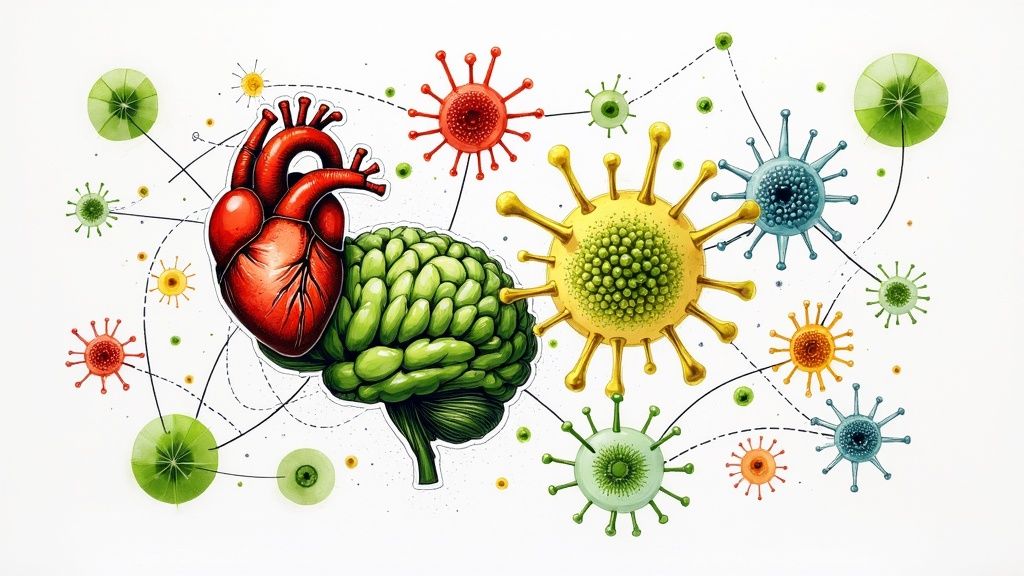Why Traditional Green Tea Can't Compare to Matcha

While matcha and traditional green tea share the same source plant, Camellia sinensis, how they're processed creates major differences in their benefits. Let's explore why matcha stands apart and what makes it such a powerful drink for your health.
The Whole Leaf Advantage
The main difference comes down to what you actually consume. When you brew regular green tea, you only get the compounds that seep into the water before throwing away the leaves. With matcha, you drink the entire leaf in powdered form, keeping all its natural goodness. This simple fact makes a huge difference – studies show matcha contains up to 137 times more of the beneficial antioxidant EGCG compared to standard green tea. By consuming the whole leaf, you get the complete package of nutrients nature intended.
Growing for Greatness: The Impact of Shading
The way matcha is grown also sets it apart. Farmers shade the tea plants from sunlight several weeks before harvest, triggering changes that boost the leaves' nutritional content. This careful process increases chlorophyll, giving matcha its deep green color, and raises L-theanine levels. When combined with matcha's natural caffeine, L-theanine helps create a balanced, focused energy – without the jitters and crash that often come from coffee.
Maximizing Antioxidant Intake with Matcha
Our bodies need antioxidants to fight off damage from harmful compounds called free radicals, which can speed up aging and increase disease risk. Matcha provides these protective compounds in abundance, especially catechins like EGCG. Research links these antioxidants to better heart health, sharper thinking, and possible cancer-fighting effects. Picture antioxidants as your body's defense system – matcha gives you more of these protective compounds than regular green tea ever could.
A Deeper Dive into Nutrients
Beyond its antioxidant content, matcha offers many other key nutrients. You'll find vitamins A, C, and E, plus minerals like potassium and iron in each serving. The tea also contains fiber that supports healthy digestion. This rich mix of nutrients makes matcha stand out as a true health-promoting drink. Adding matcha to your daily routine gives you a natural way to boost your nutrition and support your overall wellbeing with one simple cup.
The Science Behind Matcha's Weight Management Powers
Regular matcha consumption can create notable changes in your body's ability to manage weight. Beyond the metabolism boost we discussed earlier, this vibrant green powder contains specific compounds that help your body burn fat more effectively. Let's explore exactly how matcha supports weight management differently from regular green tea.
The Dynamic Duo: EGCG and Caffeine
The real power of matcha lies in how its two main compounds work together. When caffeine gives you an energy boost and speeds up calorie burning, EGCG (epigallocatechin gallate) makes these effects even stronger. Think of it like this: caffeine gets your body's engine running faster, while EGCG helps it burn fat for fuel more efficiently. This is especially noticeable during exercise, when your body is already primed to burn fat. Studies show this combination helps your body break down fat cells more effectively than either compound alone.
The Calming Influence of L-theanine
But there's more to the story – matcha also contains L-theanine, which creates a unique balanced energy. Unlike coffee jitters, matcha gives you smooth, focused energy that lasts for hours. This means you can stay active longer without feeling anxious or crashed later. Many people find this steady energy helps them maintain regular exercise routines and make better food choices throughout the day.
Real-World Results and Realistic Expectations
Research backs up what matcha drinkers report. Studies show that drinking green tea, including matcha, can help burn about 100 extra calories daily. One study tracked people for 12 weeks and found they lost an average of 1.3 kg just by adding green tea to their normal routine. Additionally, SEMrush helps track how people search for and find weight loss information online, showing growing interest in matcha's benefits.
However, let's be clear – matcha isn't a miracle weight loss solution. It works best as part of healthy eating and regular exercise. Think of matcha as a helpful tool in your weight management toolbox, not a complete solution on its own.
Maximizing Matcha's Thermogenic Effects
To get the most benefit, timing matters. Having matcha before working out can boost your fat burning during exercise. Many people also find that drinking matcha in the morning helps them stay energized and active all day. For more tips on getting the most from your matcha, check out Exploring the advantages of matcha tea.
The science shows that matcha supports weight management through several connected pathways. Understanding how these elements work together helps you use matcha effectively as part of your health routine. Just remember that lasting results come from consistent healthy habits – matcha can support your efforts, but it works best alongside good nutrition and regular movement.
Unlocking Your Brain's Full Potential with Matcha

When it comes to mental performance, matcha tea offers something unique that sets it apart from other beverages. Unlike coffee, which often leads to jitters followed by an energy crash, matcha creates what scientists describe as "calm alertness" – a balanced state where you feel both focused and relaxed. This makes it an ideal choice for anyone looking to stay sharp and productive throughout their day.
The Synergy of Caffeine and L-theanine
The magic behind matcha's effects comes from two key compounds working together: caffeine and L-theanine. While caffeine provides mental clarity and alertness, L-theanine helps create a sense of calm by promoting alpha brain wave activity. This combination means you get steady energy without feeling anxious or wired. Think of it as having a clear mind without the restlessness that often comes with other caffeinated drinks. The result is sustained focus that can last for several hours – perfect for long work sessions or studying.
Boosting Cognitive Function: Beyond Alertness
Matcha's benefits go deeper than just helping you stay alert. Research shows it can improve several aspects of brain function, including memory, reaction speed, and ability to concentrate. For example, studies have found that people who regularly drink matcha perform better on memory tests and process information more quickly. The high levels of antioxidants in matcha, especially a compound called EGCG, also help protect brain cells from damage over time. This means drinking matcha could help maintain sharp thinking as you age.
Practical Strategies for Incorporating Matcha
To get the most from matcha, timing and routine matter. Starting your day with a cup can set you up for sustained mental energy without the mid-afternoon slump common with coffee. Try combining your matcha ritual with other brain-boosting activities like a morning meditation or workout. You might even use a planning tool like Trello to schedule your matcha breaks strategically throughout the day. This helps create consistent habits that maximize the tea's benefits.
Matcha offers a smarter way to enhance mental performance that doesn't come with the downsides of typical energy drinks or coffee. By understanding how it works and making it part of your daily routine, you can experience better focus, clearer thinking, and sustained mental energy – all while feeling calm and centered.
Protecting Your Heart: Matcha's Cardiovascular Benefits
Beyond giving you mental focus and supporting healthy weight, matcha tea offers significant heart health benefits that make it a smart addition to your daily routine. Let's explore how this traditional Japanese tea works to keep your cardiovascular system strong and healthy over time.
The Antioxidant Shield: Protecting Against Damage
The antioxidants found in matcha, especially compounds called catechins and EGCG, help protect your heart cells from damage. Think of these antioxidants as tiny shields that block harmful free radicals – unstable molecules that can injure cells and lead to heart problems over time. By drinking matcha regularly, you give your cardiovascular system an extra layer of defense against this cellular damage. This protection helps keep your blood vessels healthy and reduces plaque buildup that can restrict blood flow.
Cholesterol Control: A Balancing Act
Research shows that drinking matcha consistently can help manage cholesterol levels in your blood. Specifically, it may help lower LDL cholesterol (the "bad" kind) that can build up in artery walls. When LDL levels stay too high for too long, thick plaques can form and narrow your arteries – a condition called atherosclerosis. By helping keep LDL in check, matcha supports healthy blood flow through your vessels and reduces strain on your heart muscle.
Blood Pressure Regulation: Keeping Things Smooth
Early studies suggest matcha may also help promote healthy blood pressure levels. The natural compounds in matcha appear to help relax and open up blood vessels, allowing blood to flow more freely. While scientists are still studying exactly how this works, maintaining normal blood pressure is key for preventing damage to arteries and lowering your risk of heart attacks and strokes. Making matcha part of your routine could give your body extra support in keeping blood pressure steady.
Incorporating Matcha for Heart Health
To get the most heart benefits from matcha, try having a cup each morning as part of your daily wellness habits. The steady energy it provides can power you through your day while its protective compounds work to support your cardiovascular health. Pair your matcha with other heart-healthy choices like regular exercise and a balanced diet rich in whole foods. You might even track your progress using a Fitbit to stay motivated with your fitness goals. When you combine matcha with an overall healthy lifestyle, you create a strong foundation for keeping your heart in great shape for years to come.
Fighting Aging from the Inside Out

Drinking matcha does more than just boost your heart and brain – this bright green powder can help fight aging at the cellular level. Research shows it protects and repairs cells throughout your body, supporting not just a youthful appearance but also better health as you age.
The Power of Polyphenols and Catechins
The real magic of matcha lies in its rich polyphenol content. These antioxidants protect your cells from damage by neutralizing harmful free radicals – unstable molecules that can accelerate aging. Matcha contains especially high levels of catechins, particularly EGCG (epigallocatechin gallate). Studies show that a cup of matcha has far more EGCG than regular green tea. This concentrated dose of protective compounds makes matcha especially effective at slowing cellular aging.
Combating Oxidative Stress and Inflammation
Over time, free radical damage builds up and throws off the balance in your cells – a process called oxidative stress. The antioxidants in matcha help prevent this by mopping up free radicals before they can cause harm. Matcha also helps reduce inflammation in the body, another key driver of aging. By fighting both oxidative stress and inflammation, matcha helps keep your cells healthy and functioning well as you age.
Maximizing Matcha's Anti-aging Benefits
Getting the most benefit from matcha starts with proper preparation. Use high-quality powder and whisk it thoroughly to release all the beneficial compounds. Many people find that drinking matcha in the morning works best, since it provides steady energy and antioxidant protection throughout the day. For example, you might pair your morning matcha with meditation or exercise. Some people use Asana to track their matcha routine along with other healthy habits.
Dosage and Potential Interactions
Start with small amounts of matcha and increase slowly to see how your body responds. Be mindful that matcha contains caffeine, which some people are sensitive to. Check with your doctor before adding matcha to your routine, especially if you take medications or have health conditions. This helps ensure matcha will work well with your individual needs. When used thoughtfully as part of a healthy lifestyle, matcha can be a valuable tool for supporting cellular health and graceful aging.
Practical Guide to Making Matcha Work for You

Making matcha part of your daily routine takes more than just mixing powder with water. Let's look at the key elements that help you get the most from this ancient tea through proper preparation, smart timing, and regular practice.
Choosing Your Matcha: Quality Matters
The type of matcha you choose directly affects both taste and health benefits. A bright, vibrant green color shows high chlorophyll content – exactly what you want. While ceremonial grade offers a smooth, sweet flavor perfect for drinking plain, culinary grade works better in recipes and smoothies since its slightly stronger taste blends well with other ingredients. For daily drinking, good culinary grade matcha gives you plenty of benefits at a reasonable price. Store your matcha in an airtight container away from light and heat to keep it fresh longer.
Mastering the Whisk: Traditional Preparation
The classic way to prepare matcha uses a bamboo whisk (chasen) and bowl. First, sift the powder to break up any clumps. Then add water heated to about 175°F (80°C) – not boiling – and whisk in a "W" pattern until you see foam. Though electric frothers are convenient, the bamboo whisk creates the best texture and helps release more beneficial compounds. When you're short on time though, an electric frother still makes a good cup.
Timing is Key: Optimizing Matcha's Effects
When you drink your matcha matters just as much as how you prepare it. Having matcha before exercise can boost fat burning because of how caffeine and EGCG work together. Many people find a morning cup gives steady energy all day without the afternoon crash that often comes with coffee. Try drinking matcha at different times to see what fits your body's needs. Some people love it for focused work, while others enjoy it as a calming evening ritual.
Building a Matcha Habit: Tips for Consistency
Making matcha a regular part of your day takes some planning. Begin with just a few cups each week, then add more as it becomes routine. Try combining your matcha breaks with other healthy practices like writing in a journal or doing breathing exercises. Using a habit tracker like Notion can help you stay consistent by planning your matcha times and watching your progress.
Addressing Potential Challenges
While matcha offers many benefits, some people are sensitive to its caffeine. Start with small amounts and pay attention to how you feel. Also keep in mind that matcha can affect certain medications, so check with your doctor first if you have any health conditions. By watching for these issues and adjusting as needed, you can enjoy all that matcha has to offer as part of a balanced lifestyle.
Ready to try matcha for yourself? Check out our selection of high-quality matcha teas to find your perfect match. Visit matcha-tea.com to get started!
